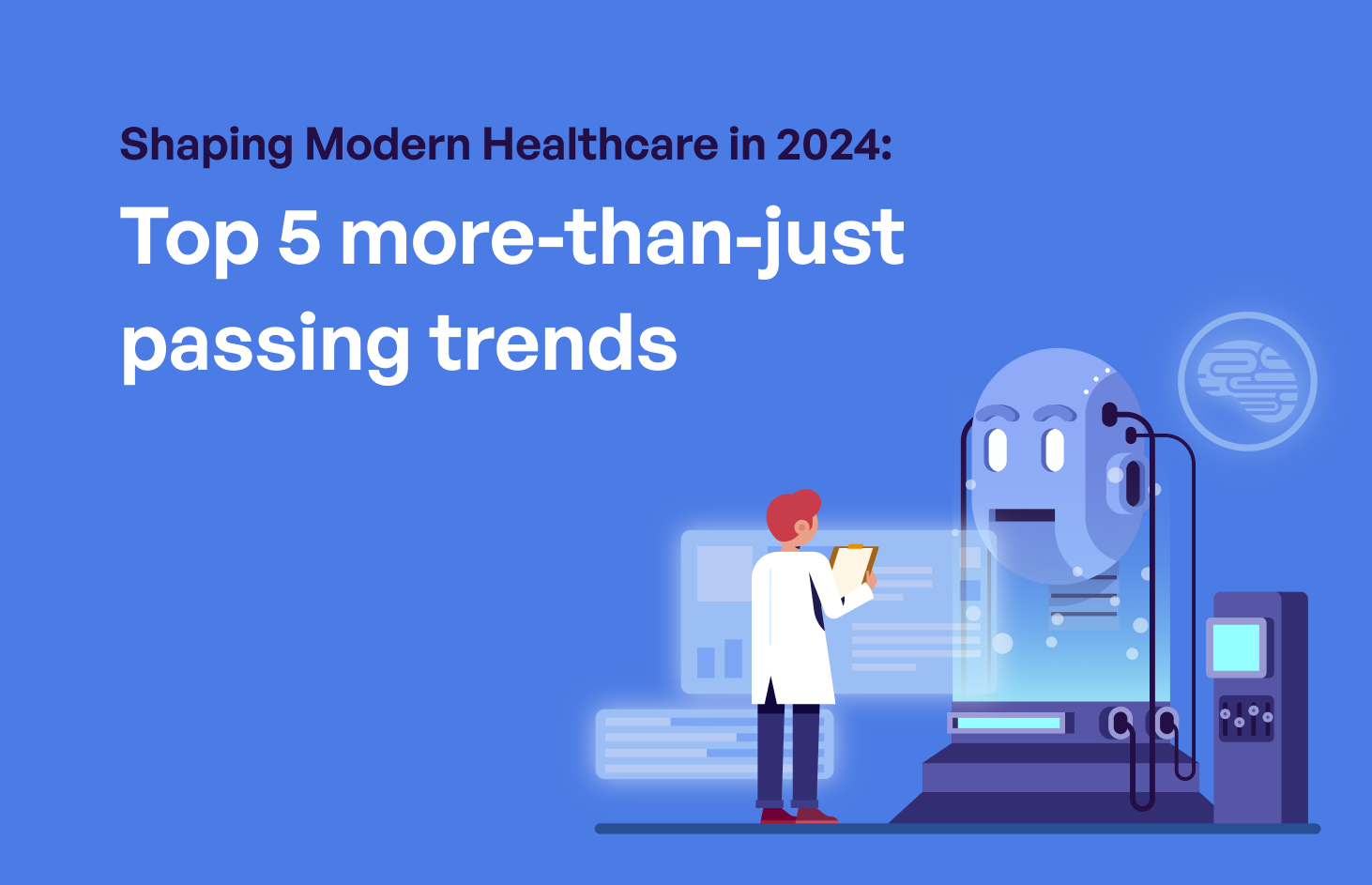Shaping Modern Healthcare in 2024: Top 5 more-than-just passing trends
April 12, 2024

The new world is drawing closer through the digital realm. One could easily believe this scenario of a patient in a remote village receiving real-time advice from a specialist becoming true today. This reality could only be made possible, thanks to advanced digital connectivity and telemedicine.
But this still doesn’t deflate the existing healthcare challenges surfacing for the industry like costs, data worries, and the need for personal care.

Top 5 Challenges Prevalent in the Healthcare Industry
1. Soaring Healthcare Expenses
Rising healthcare costs have pushed the healthcare industry to evaluate its challenges in optimizing its services.
One of the resolutions embraces cloud-based data management that allows the healthcare industry to reduce its administrative burdens. This in return enables remote patient monitoring, thus minimizing their costs.
2. Personalized Patient Dilemma
In the healthcare industry, the increasing patient numbers are inversely proportional to the limited healthcare resources. The industry is facing difficulty in providing personalized patient care.
But with the adoption of Digital Health, personalized care can be successfully empowered by integrating application modernization services. This reduces the challenges of vast patient data management and RPM (Remote Patient Monitoring) due to effective communication and collaboration among healthcare professionals.
3. Data Security and Compliance Crunch
Another issue with the ever-increasing patient data is the data breaches and legal complexities.
Managed IT services, in this case, focus more on ethical and legal standards by protecting patient information that adheres to regulations like GDPR.
4. Technology Trust Gap
A vast majority of players in the healthcare sector don’t adopt new technologies. The main reasons for the same are lack of trust, high investments, and regulatory intricacies.
Since, there have been substantial developments in AI, Cloud Computing, and Data Analytics, managed IT services are driving the healthcare industry towards a secure and smooth transition.
5. Limited Interoperability
Have you ever realized how inefficient healthcare processes and administrative complexity are a major benefactor in unanticipated and unavoidable health expenses? This issue of seamless data sharing has paved the way for Electronic Health Records (EHR).
Through EHR, healthcare professionals can access any patient health record at the click of a button, without wasting much time and effort of the healthcare professionals and staff. A centralized repository for patient data has facilitated seamless communication among various healthcare departments.
Top 5 Trends Responsible for Healthcare Industry

1. AI-powered Healthcare Tools
Enabling the hospital functionality to be more data-driven, predictive analysis can be used to manage staff and resource allocation. It also aids in monitoring the equipment and predicting the specific parts of the equipment that need maintenance or replacement.
AI-powered tools create peaceful work environments since they foster automated and streamlined routine tasks. This eases their workload, especially when there’s a staff shortage or resource crunch. This would allow the professionals to focus more time on patient care.
2. Digital Twin Technology
Digital Twin Technology is one of the groundbreaking discoveries since it’s a significant part of the quantum computing revolution. It’s fascinating to leverage the potential of this technology as it’s unlike anything the modern healthcare industry has ever witnessed.
The advent of digital twin technology creates a virtual model of biological materials such as a patient’s anatomy, or even a medical device. These virtual models are then used to manipulate and conduct extensive testing, research, and analysis in a virtual environment without the interference of physical models unless needed.
Here are the top two benefits from the groundbreaking technology:
- This significantly reduces costs and fastens the research & development cycle.
- It further empowers healthcare professionals to provide personalized patient care, chart out complex procedures, and mitigate patient-specific risks.
3. Virtual Hospitals
Known to be one of the major healthcare technology trends of 2024, the centralized hub in virtual hospital wards goes beyond the basic video consultations in remote settings, colliding the world of telemedicine and wearables with the Internet of Medical Things; it’s more comprehensive in its approach toward remote therapy and patient management.
4. Telehealth services
Many Telehealth services like Telemedicine have transformed the way healthcare professionals treat patients. Now patients don’t have to travel to the clinic for acute or chronic illnesses, thanks to telemedicine, they can get remote patient care easily, thus saving their time and cost. As a part of the managed IT services, remote monitoring streamlines the patient healthcare data, going beyond traditional healthcare services.
The constant updates in these technologies are helping the industry to significantly cut their costs, by offering real-time data and mitigating the issues of staff and healthcare professional shortages.
5. Smart health devices
It’s already been a decade since the rise of smartwatches and other advanced health devices that can track vital signs and keep us healthy.
This trend will keep growing and make its way into 2024, closely monitoring even the children’s growth and aiding dental care habits.
With the advent of smart health devices, people can anticipate and prevent potential health issues. For instance, in oral hygiene, AI-synced electric toothbrushes are seeping into people’s everyday lives, alerting them with brushing data and suggesting personalized recommendations for better routines.
Conclusion
The journey of modern healthcare industries with online healthcare applications, and websites is leading to the better accessibility of patient’s health data and self-management.
The trends discussed in this blog have opened a new path to emphasize communication and collaboration between patients and healthcare services. Only those who understand the importance of personalized healthcare and digital prowess can make an informed and mutually beneficial decision.
Keep reading about
LEAVE A COMMENT
We really appreciate your interest in our ideas. Feel free to share anything that comes to your mind.
Our 16 years of achievements includes:
-
10M+
lines of codes
-
2400+
projects completed
-
900+
satisfied clients
-
16+
countries served




